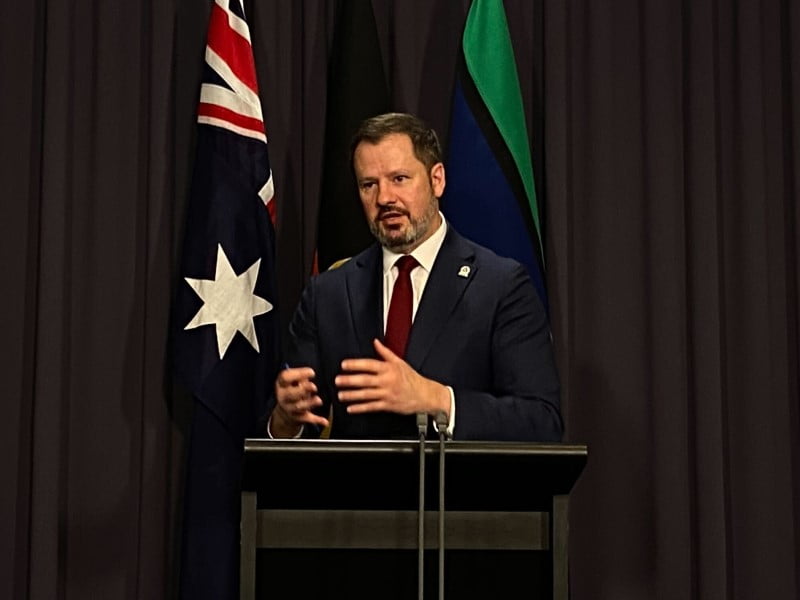Former Clean Energy Finance Corporation director Martijn Wilder will chair the eight-member board of the Albanese government’s $15 billion National Reconstruction Fund.
Industry and Science minister Ed Husic announced the board on Wednesday, appointing directors with expertise across the seven industry priority areas of the National Reconstruction Fund (NRF).
Both sides of politics are also represented, with former Coalition minister Kelly O’Dwyer and former Australian Workers Union secretary Daniel Walton appointed.
Mr Wilder, the founder and chief executive of climate change investment and advisory firm Pollination, takes up the role as NRF chair almost a decade after being appointed the founding director of the Clean Energy Finance Corporation, on which the NRF is modelled.
He is also the former chair of the Australian Renewable Energy Agency and the Victorian government’s independent panel on its 2035 climate target.
The remaining five board members are:
- Daniel Petre: Co-founder and Partner Emeritus of AirTree Ventures. He is an experienced tech executive and director and is currently a member of the University of New South Wales Centre for Social Impact advisory council. He is also chair of disability accommodation provider Vera Living and sits on the board of MedTech firm MetaOptima Technology.
- Ahmed Fahour: Invest Victoria chair an former managing director and chief executive of Australia Post, Latitude Financial, NAB Australia and Citigroup Alternative Investments.
- Dr Katharine Giles: Chief executive and managing director of Western Australian BioTech firm OncoRes Medical. Dr Giles is also venture partner at Brandon Capital, director of Sonic Healthcare, and a member of the Curtin University Commercialisation Advisory Board.
- Kathryn Presser: South Australian Department of Treasury and Finance’s Risk and Performance Committee chair. She is also a director for the Australian Energy Market Operator, the Police Credit Union SA & NT, and Funds SA
- Karen Smith Pomeroy: Regional Investment Corporation chair and the National Affordable Housing Consortium chair. She is also a director of financial services firm Kina Securities, Queensland state-owned energy company Stanwell Corporation, and the Queensland Treasury Corporation capital markets board.
Advice on potential board members was provided by the Department of Industry, Science, and Resources to Mr Husic following a talent-search led by NGS Global.

Mr Husic said he was recommended a list of potential board members from the Department which was longer than eight individuals — the maximum number of board members that can be appointed — but would not comment on how many board members were shortlisted by the government independent of the Department’s recommendations.
“It’s a National Reconstruction Fund. We want people from different corners of the country. And in making those decisions, we want to make sure we’ve got candidates from different backgrounds and different parts of the nation,” Mr Husic said.
“Going through that we want to be able to say to you that we’ve got a board of those different perspectives and experiences and that’s what you’ve got right here.”
Mr Husic said it was important to appoint board members from different viewpoints even if they were affiliated with a different political party to the government, as in the case of Ms O’Dwyer.
Ms O’Dwyer was previously a senior adviser to then-Treasurer Peter Costello and in 2015 was made a cabinet minister under former Prime Minister Malcolm Turnbull. She served in several portfolios including as Minister for Revenue and Financial services.
She ended her political career after serving a year as Minister for Jobs and Industrial Relations in 2019. She then moved into financial services and is currently a non-executive director at HMC Capital, Equity Trustess, Barrenjoey, and HealthCo Healthcare & Wellness REIT.
Mr Husic lamented that despite offering to negotiate with the federal opposition on several occassions, they refused to back the fund out right.
“We’ve said to the Coalition all along, we want to be able to work with them on this, we think this is an important part of a national architecture to deepen the economic complexity of the nation,” Mr Husic said.
“But we are very keen to bring people with different viewpoints on board and we want this to be something like the CEFC that manages to continue through different political administrations because it’s very important.”
Mr Husic did not commit to an expected timeline for the development of the investment mandate or the appointment of the NRF chief executive.
Work on the investment mandate that will guide the board and the target rate of return for the fund began after the legislation passed through Parliament in March. A chief executive must be appointed by mid-April 2024, per legislation.
“[The board] will go through the process of finding the chief executive and the senior leadership team in the coming months…We don’t want to rush decisions. We want right decisions, we don’t want decisions in the political interest but in the national interest,” Mr Husic said.
Do you know more? Contact James Riley via Email.

